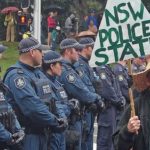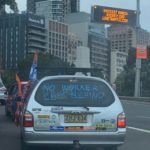COVID-19 Highlights the Need for an Australian Bill of Rights

Around the world, legal proceedings are being commenced against governments over social control measures implemented during COVID-19, but this presents a legal conundrum which must weigh the reduction of freedoms and legal safeguards against the need to stop the spread of the virus.
Legal proceedings
This week, Human Rights lawyers in Zimbabwe petitioned the country’s High Court to have the nation’s lockdown overturned after police unleashed a dog on a woman for violating a curfew. According to court papers, police and army officers assaulted the woman while she was cooking food in her yard, and the petition argues that elements of the controls unjustifiably violate the nation’s constitution, as in the circumstances the woman posed no danger to others.
Also in Zimbabwe, the Association for Doctors for Human Rights (ZADHR) has taken the government to court to compel authorities urgently to provide personal protective equipment (PPE) for medical practitioners, warning that medics in the troubled health sector will otherwise die.
Recently in Germany, a medical lawyer has started to prepare proceedings against the Federal and State governments on the basis that aspects that nation’s control measures unjustifiably violate the fundamental rights of its citizens.
Lawsuits have also been commenced due to alleged government mismanagement, which plaintiffs claim has caused preventable suffering and death.
In Austria, for example, a class action by 2,500 skiers claims that authorities acted with “negligent endangerment” by failing to protect them from the outbreak. The case was brought after hundreds of Europe’s first cases of Covid-19 were traced to a resort at Ischgl in that nation.
Man shot dead for not following the rules
In the Philippines, a man was reportedly shot dead by police for breaking curfew as the government enforces extreme measures, ostensibly to stop the spread of COVID-19.
Governments around the world have justified draconian control measures on the basis that these are ‘unprecedented times’ and therefore require ‘unprecedented measures’, but many are finding it difficult to see how some of the rules are anything more than an unwarranted power grab – one whose ends does not justify the means.
A green light for governments
When the World Health Organisation declared a global pandemic on 11 March 2020, it urged governments everywhere to take action to stop the spread of COVID-19.
The discussion pointed to international human rights law which makes clear that, “restrictions on some rights can be justified when they have a legal basis, are strictly necessary, based on scientific evidence and neither arbitrary nor discriminatory in application, of limited duration, respectful of human dignity, subject to review, and proportionate to achieve the objective.”
This led to governments passing and enforcing rules which can be described as extreme in nature, often inconsistent and having tenuous legal justification.
Looking at their own constitutional protections as well as ratified international instruments, lawyers and citizens in several nations have reached the view that some of the controls are unlawful, in so far as they have no ‘legal basis’ and are not ‘strictly necessary’ in the current environment.
But what about our constitution?
Similar sentiments are being expressed in Australia regarding the justifiability of, and inconsistencies created by, some of the rules.
For example in New South Wales, you can’t go on a drive around the block by yourself but you can be at a workplace with others. You can’t sunbake alone, or sit on a park bench by yourself, or go for a swim the ocean but kids can go to school and sit next to other students. You can’t sit next to others in an open public area but you can sit next to persons on an enclosed bus or train, or even in the small space of a taxi or Uber with drivers who have been in close proximity with dozens of unknowns. You can get a haircut, but not a manicure. The list goes on and on – and some of the rules don’t seem to be justified given the aim is physical distancing.
But unlike most other Western nations, the Australian constitution does very little to help citizens challenge governmental abuses of power.
In fact, our constitution expressly guarantees just five rights, which are:
- The right to vote (Section 41),
- Protection against acquisition of property on unjust terms (Section 51 (xxxi)),
- The right to a trial by jury for criminal cases in the higher courts (Section 80),
- Freedom of religion (Section 116), and
- Prohibition of discrimination on the basis of State of residency (Section 117).
The High Court has also implied a freedom of political communication into the constitution, which is necessary in a democracy in order for a citizen to:
“communicate his or her views… criticize government decisions and actions, seek to bring about change, call for action where none has been taken and in this way influence the elected representatives…”
The Court added that:
“Absent such a freedom of communication, representative government would fail to achieve its purpose, namely, government by the people through their elected representatives.”
However, the Court also made clear that the freedom is not unfettered. Rather, the applicable test was set out in the case of Lange v Australian Broadcasting Corporation (1997), in which the justices ruled that legislation is permissible if it satisfies a legitimate purpose and fulfils two conditions:
- It is compatible with the maintenance of the representative and responsible government mandated by the Constitution, and
- It is “reasonably appropriate and adapted” to the fulfilment of a legitimate purpose.
This significant restriction on the ‘freedom’ has enabled governments to pass laws which restrict free political speech.
That said, there is an argument that current rules which prohibit the expression of political concerns may be invalid where protesters are observing the objectives of physical distancing – which are ostensibly the purpose of the COVID-19 social controls. So, for example, there is a case to be made that orders prohibiting protesting from vehicles may be unconstitutional.
The need for a Bill of Rights
The lack of constitutionally protected rights in Australia has led to calls for a national Bill or Charter of Rights – in order to act as a safeguard against government overreach.
However, successive federal governments have actively resisted those calls – preferring to protect and enhance their own powers at the expense of basic civil liberties and legal safeguards.
Indeed, Australia continues to be the only Western democracy that does not have a Bill or Charter of Rights.
This is something which needs to be rectified if Australians are to have the ability to challenge abuses of power by governments and to protect freedoms that are fundamental to a democracy.








